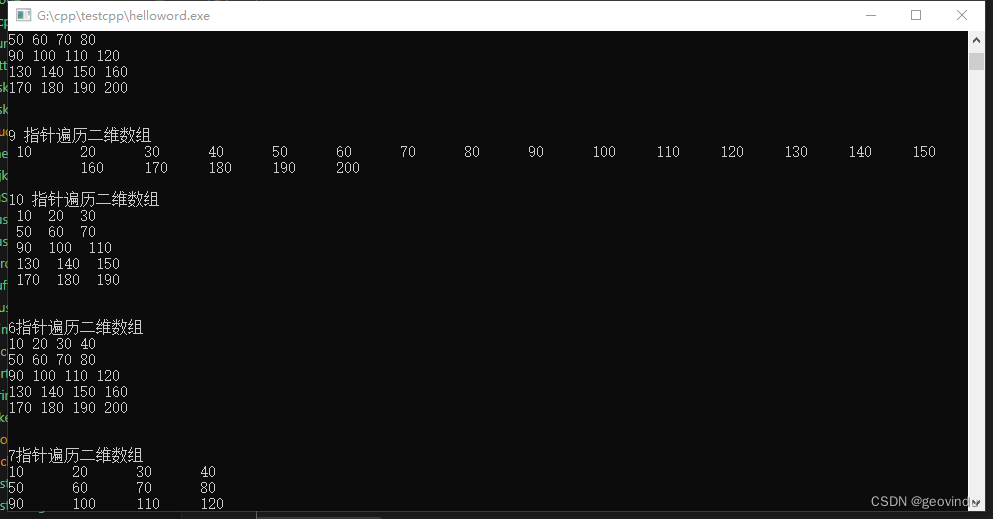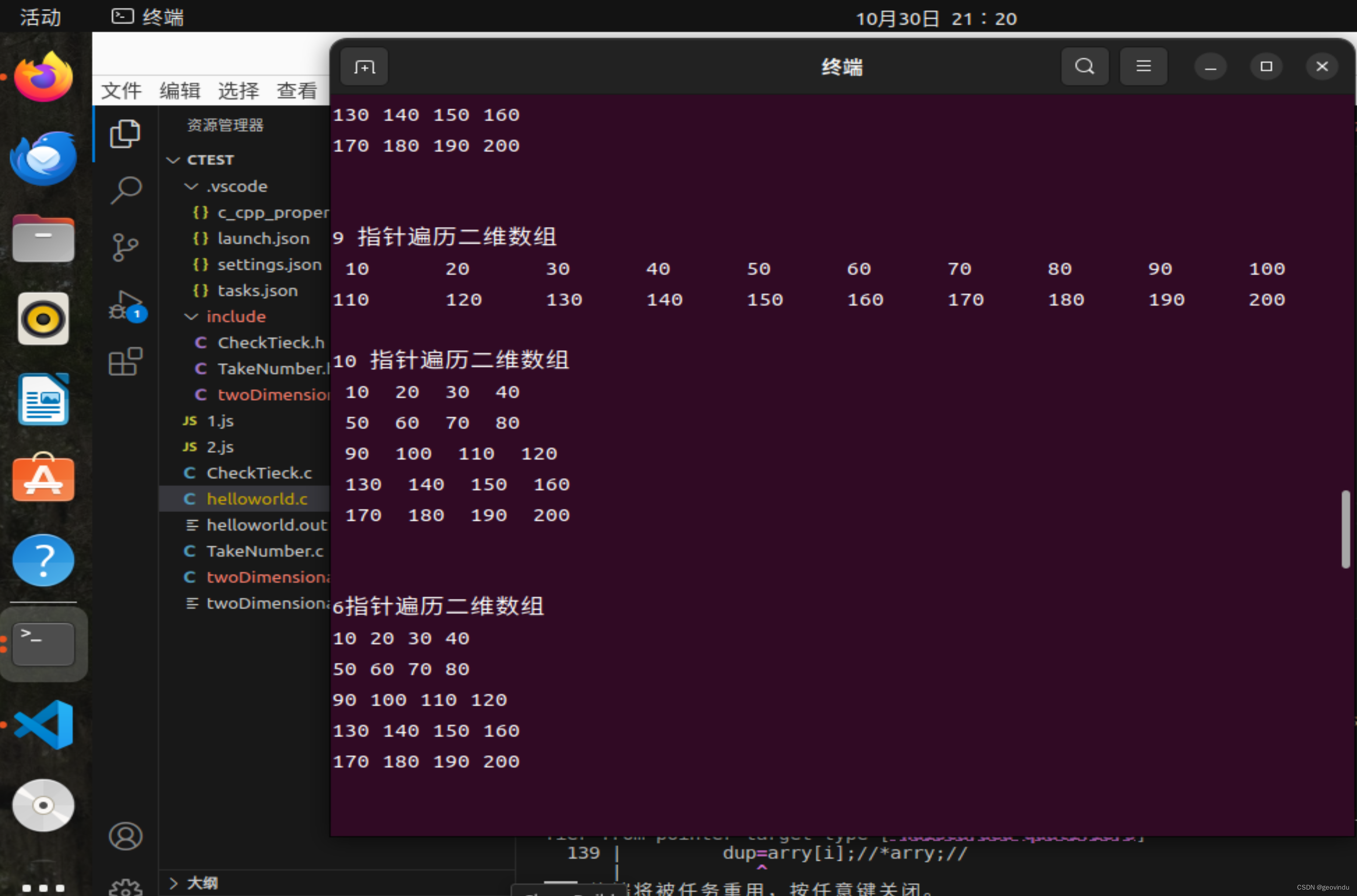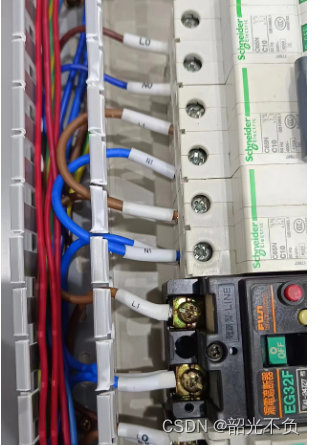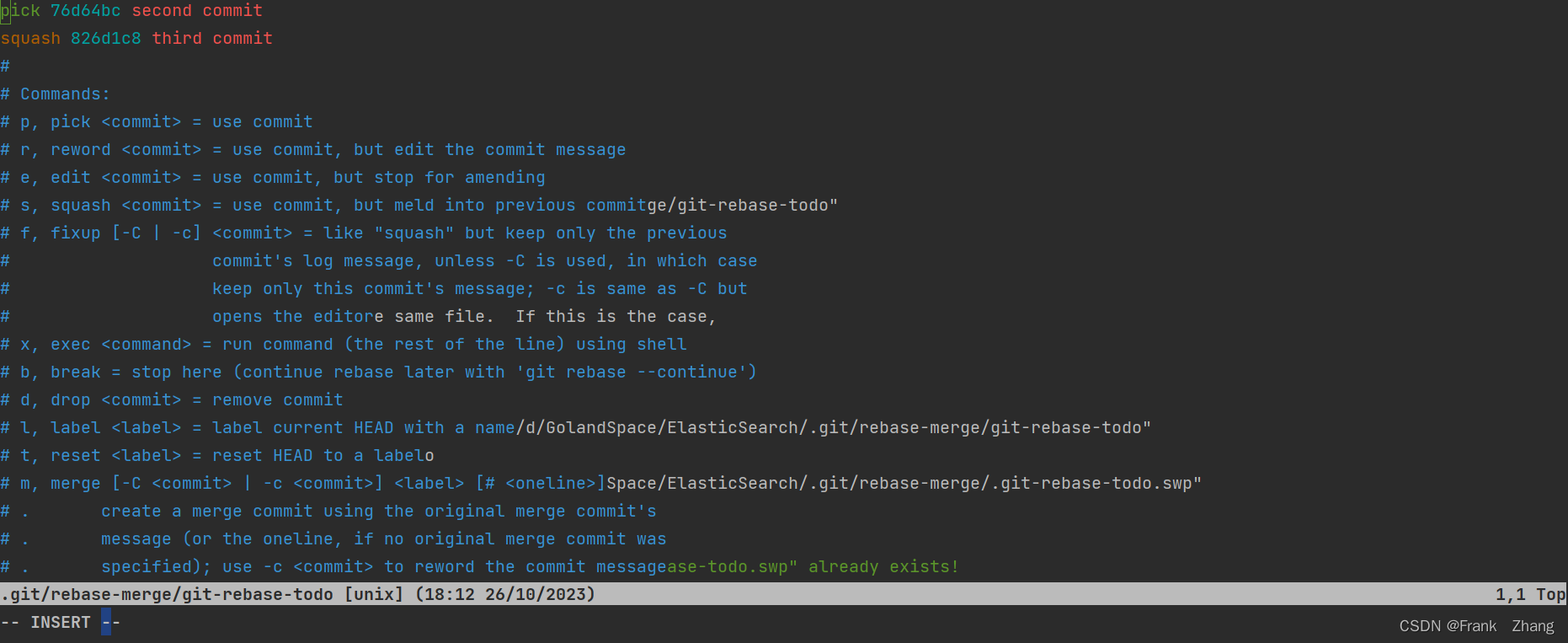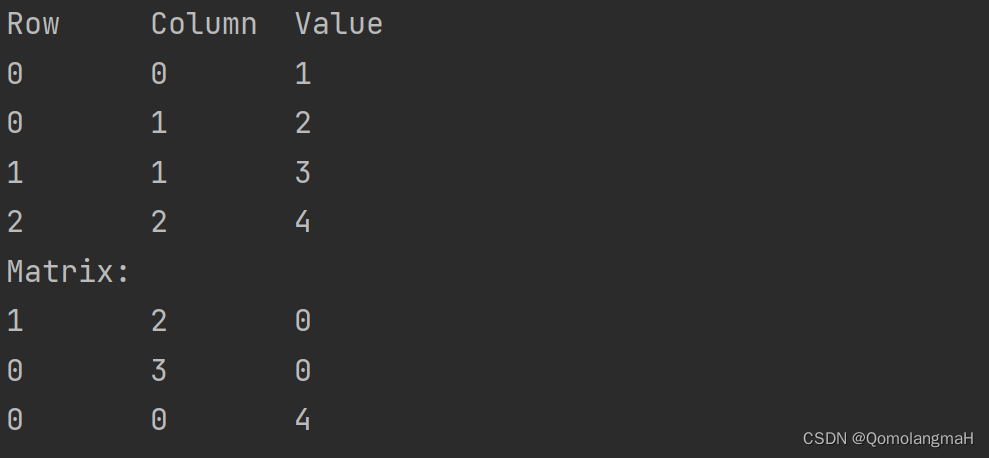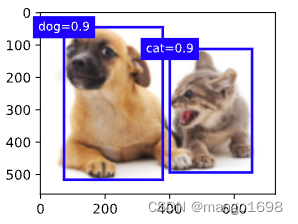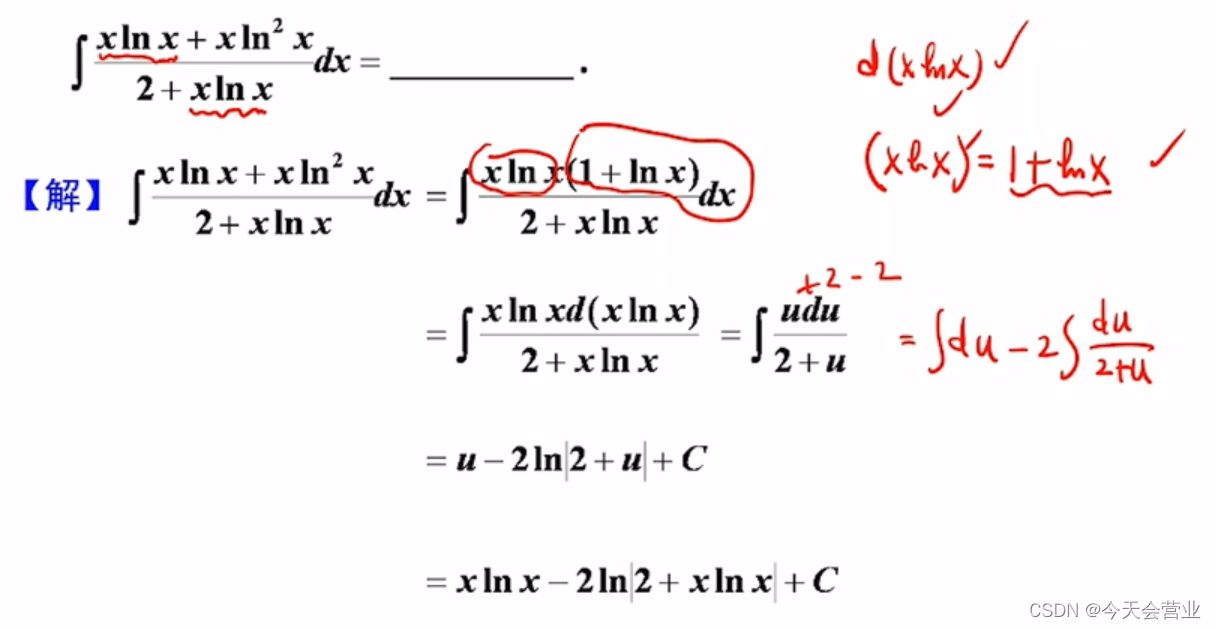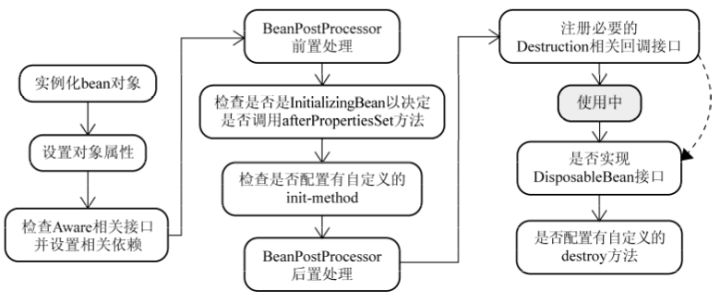/*** ****************************************************************************** @file twoDimensional.h* @brief 二维数组 Pointers and 2-D arrays* @author geovindu,Geovin Du,涂聚文 (geovindu@163.com)* ide: vscode c11,c17 windows 10* @date 2023-10-30* @copyright geovindu 站在巨人的肩膀上 Standing on the Shoulders of Giants* matrix => Points to base address of two-dimensional array.Since array decays to pointer.*(matrix) => Points to first row of two-dimensional array.
*(matrix + 0) => Points to first row of two-dimensional array.
*(matrix + 1) => Points to second row of two-dimensional array.**matrix => Points to matrix[0][0]
*(*(matrix + 0)) => Points to matrix[0][0]
*(*(matrix + 0) + 0) => Points to matrix[0][0]
*(*matrix + 1) => Points to matrix[0][1]
*(*(matrix + 0) + 1) => Points to matrix[0][1]
*(*(matrix + 2) + 2) => Points to matrix[2][2]* ******************************************************************************/#ifndef TWODIMENSIONAL_H_
#define TWODIMENSIONAL_H_#include <stddef.h>
#include <stdbool.h>#define BUF_LEN 100 // Length of input buffer
#define COUNT 5 // Initial number of strings/*** @brief 输入字符排序**/
void stringInputSort();/*** @brief** @param arry 二维数组* @param row 行长度* @param col 列长度* @return int*/int pointDisplay(const int** arry,int row,int col);/*** @brief * @param arry 二维数组* @param row 行长度* @param col 列长度* @return int*/int pointDisplay1(const** arry,int row,int col);/*** @brief * @param arry 二维数组* @param row 行长度* @param col 列长度* @return int*/int pointDisplay0(int arry[10][10],int row,int col);/*** @brief OK** @param arry 二维数组* @param intlength 行列共长度* @return int*/
int pointDisplay2(int arry[10][10],int intlength);/*** @brief** @param arry 二维数组* @param row 行长度* @param col 列长度* @return int*/
int pointDisplay3(int** arry,int row,int col);/*** @brief Ok* @param arry 二维数组* @param row 行长度* @param col 列长度* @return int*/
int pointDisplay4(int** arry,int row,int col);/*** @brief OK * @param arry 二维数组* @param row 行长度* @param col 列长度* @return int*/
int pointDisplay5(int*** arry,int row,int col);/*** @brief ok * @param arry 二维数组* @param row 行长度* @param col 列长度* @return int*/
int pointDisplay6(int** arry,int row,int col);/*** @brief 释放所有堆内存 * @param ps* @param n**/
void freeMemoryChar(char **ps,size_t n);/*** @brief 释放所有堆内存 * @param ps* @param n**/
void freeMemoryInt(int **ps,size_t n);#endif/*** ****************************************************************************** @file twoDimensional.c* @brief 二维数组 Pointers and 2-D arrays* @author geovindu,Geovin Du,涂聚文 (geovindu@163.com)* ide: vscode c11,c17 windows 10* @date 2023-10-30* @copyright geovindu 站在巨人的肩膀上 Standing on the Shoulders of Giants* ******************************************************************************/#include <stddef.h>
#include <stdio.h>
#include <stdbool.h>
#include <stdlib.h>
#include <string.h>
#include <malloc.h>
#include "include/twoDimensional.h"/*** @brief 输入字符排序**/
void stringInputSort()
{char buf[BUF_LEN]; // Input buffersize_t str_count = 0; // Current string countsize_t capacity = COUNT; // Current maximum number of stringschar **pS = calloc(capacity, sizeof(char*)); // Pointers to stringschar** psTemp = NULL; // Temporary pointer to pointer to charchar* pTemp = NULL; // Temporary pointer to charsize_t str_len = 0; // Length of a stringbool sorted = false; // Indicated when strings are sortedprintf("Enter strings to be sorted, one per line. Press Enter to end:\n");// Read in all the stringschar *ptr = NULL;while(true){ptr = fgets(buf, BUF_LEN, stdin);if(!ptr) // Check for read error{printf("Error reading string.\n");free(pS);pS = NULL;return 1;}if(*ptr == '\n') break; // Empty line checkif(str_count == capacity){capacity += capacity/4; // Increase capacity by 25%if(!(psTemp = realloc(pS, capacity))) return 1;pS = psTemp;}str_len = strnlen(buf, BUF_LEN) + 1; //strnlen_sif(!(pS[str_count] = malloc(str_len))) return 2;strcpy_s(pS[str_count++], str_len, buf);}// Sort the strings in ascending orderwhile(!sorted){sorted = true;for(size_t i = 0 ; i < str_count - 1 ; ++i){if(strcmp(pS[i], pS[i + 1]) > 0){sorted = false; // We were out of order so...pTemp= pS[i]; // swap pointers pS[i]...pS[i] = pS[i + 1]; // and...pS[i + 1] = pTemp; // pS[i + 1]}}}// Output the sorted stringsprintf("Your input sorted in ascending sequence is:\n\n");for(size_t i = 0 ; i < str_count ; ++i){printf("%s", pS[i] );free(pS[i]); // Release memory for the wordpS[i] = NULL; // Reset the pointer}free(pS); // Release the memory for pointerspS = NULL; // Reset the pointer}/*** @brief 可以** @param arry 二维数组* @param row 行长度* @param col 列长度* @return int*/int pointDisplay(const** arry,int row,int col){//在main 中直接使用可以printf("\n6指针遍历二维数组\n");int *dup;//dup= arry[0]; //*(*(arry + 0));//*(arry + 0);//for (int i = 0; i < row; i++) //sizeof(arry) / sizeof(int){dup= arry[i];for(int j=0;j<col;j++){printf("%d ",*dup++);}printf("\n");}printf("\n");}/*** @brief * @param arry 二维数组* @param row 行长度* @param col 列长度* @return int*/int pointDisplay1(const** arry,int row,int col){//在main 中直接使用可以printf("\n7指针遍历二维数组\n");int* dup;for (int i = 0; i < row; i++) //sizeof(arry) / sizeof(int){dup=arry[i];//*arry;// for(int j=0;j<col;j++){// printf ("%d \t", *(dup+i)); //printf("\n"); //显示了第一行printf ("%d \t", *(dup+j)); }//printf("%d ",*dup++);printf("\n");}printf("\n");}/*** @brief * @param arry 二维数组* @param row 行长度* @param col 列长度* @return int*/int pointDisplay0(int arry[10][10],int row,int col){printf("\n14指针遍历二维数组\n");int *dup;dup=&arry[0][0];for (int i=0; i<row; i++){for (int j=0; j<col; j++){printf ("%d \t", *(dup+i*col+j));}printf("\n");}int (*pp)[col]=arry;printf("\n1列的首位元素\n");for(int k=0;k<row;k++){printf(" %d ",*pp[k]); //列的首位元素}printf("\n");printf("\n2第一行的遍历值\n");for(int k=0;k<row;k++){printf(" %d ",(*pp)[k]); //第一行的遍历值}printf("\n");}
/*** @brief** @param arry 二维数组* @param intlength 行列共长度 row*col* @return int*/
int pointDisplay2(int arry[10][10],int intlength)
{printf("\n9 指针遍历二维数组\n");//int llen=4*5;for(int i=0;i<intlength;++i){printf(" %d\t",*(*arry+i));}printf("\n");}/*** @brief 可以** @param arry 二维数组* @param row 行长度* @param col 列长度* @return int*/
int pointDisplay3(int** arry,int row,int col)
{//在main 中直接使用可以printf("\n10 指针遍历二维数组\n");int *ddpp;//=*arry;for(int i=0;i<row;++i){ddpp=*(arry+i);for (int j = 0; j < (col-1); j++) {printf(" %d ",*(ddpp+j));}printf("\n");}printf("\n");
}
/*** @brief Ok* @param arry 二维数组* @param row 行长度* @param col 列长度* @return int*/
int pointDisplay4(int** arry,int row,int col)
{printf("\n11 指针遍历二维数组\n");for (int i = 0; i < row; i++) {for (int j = 0; j < col; j++) {printf("%d ", arry[i][j]);}printf("\n");}printf("\n");
}
/*** @brief ok * @param arry 二维数组* @param row 行长度* @param col 列长度* @return int*/
int pointDisplay6(int** arry,int row,int col)
{printf("\n13 指针遍历二维数组\n");for (int i = 0; i < row; i++) {//printf("Address of %d th array %u \n",i , *(arry + i));for (int j = 0; j < col; j++) {printf("%d ", *( *(arry + i) + j));}printf("\n");}printf("\n");
}
/*** @brief OK * @param arry 二维数组* @param row 行长度* @param col 列长度* @return int*/
int pointDisplay5(int*** arry,int row,int col)
{printf("\n12 指针遍历二维数组\n");for (int i = 0; i <row; i++) {for (int j = 0; j <col; j++){printf("%d ", *arry[i][j]);}printf("\n");}printf("\n");
}/*** @brief 释放所有堆内存 * @param ps* @param n**/
void freeMemoryChar(char **ps,size_t n)
{for(size_t i=0;i<n;n++){free(ps[i]);ps[i]=NULL;}free(ps);ps=NULL;
}/*** @brief 释放所有堆内存 * @param ps* @param n**/
void freeMemoryInt(int **ps,size_t n)
{for(size_t i=0;i<n;n++){free(ps[i]);ps[i]=NULL;}free(ps);ps=NULL;
}调用:
windows 10:
int main()
{printf("hello c world \n");printf("你好,中国\n");// stringInputSort();int arrdu[5][4]={{10,20,30,40},{50,60,70,80},{90,100,110,120},{130,140,150,160},{170,180,190,200} };// 4 列int dum=4;//5 行int dun=5;for(int i = 0; i <dun ; i++){for (int j = 0; j < dum; j++) {printf("%d ", arrdu[i][j]);}printf("\n");}printf("\n\n");for(int i = 0; i <dun ; i++){printf("Address of %d th array %u \n",i , *(arrdu + i));for(int j = 0; j <dum ; j++){printf("arr[%d][%d]=%d\n", i, j, *( *(arrdu + i) + j) );}printf("\n\n");}int* ptr = malloc((dum * dun) * sizeof(int));/* Putting 1 to 12 in the 1D array in a sequence */for (int i = 0; i < dun * dum; i++)ptr[i] = i + 1;//int** pe;//pe=arrdu;/**///分配内存int** pe = (int**)malloc(sizeof(int)*dum);for(int i=0; i<dun; i++){pe[i] = (int*)malloc(sizeof(int)*dum);}//初始化内存//memset(*pe, 0, sizeof(int)*dum*dun);//2分配内存int*** arr2 = malloc(dum * sizeof(int**));for (int i = 0; i < dun; i++)arr2[i] = malloc(dun * sizeof(int*));// Initialising each element of the// pointer array with the address of// element present in the other arrayfor (int i = 0; i <dun; i++) {for (int j = 0; j <dum ; j++) {arr2[i][j] = &arrdu[i][j];}}printf("The values are\n");for (int i = 0; i <dun ; i++) {for (int j = 0; j <dum ; j++) {printf("%d ", *arr2[i][j]);}printf("\n");}//strcpy(pe,arrdu);for (int i = 0; i <dun ; i++){for (int j = 0; j <dum ; j++){pe[i][j]= arrdu[i][j];//ptr[i][j]=arrdu[i][j];//strcpy(pe[i][j],arrdu[i][j]);printf("%d\n",arrdu[i][j]);} }printf("PE The values are\n");for (int i = 0; i < dun; i++) {for (int j = 0; j <dum ; j++) {printf("%d ", pe[i][j]);}printf("\n");}pointDisplay0(arrdu,dun,dum); //okpointDisplay4(pe,dun,dum); //okpointDisplay5(arr2,dun,dum); //okpointDisplay6(pe,dun,dum); //okpointDisplay2(arrdu,dum*dun); //okpointDisplay3(pe,dun,dum);pointDisplay(pe,dun,dum); //12pointDisplay1(pe,dun,dum); //12//释放资源free(pe);free(arr2);pe=NULL;arr2=NULL;system("pause");// linux 无效 ,只win 下有效return 0;}window10 or Ubuntu 20.4
#include "include/twoDimensional.h"int main()
{printf("hello c world, \n");printf("你好,中国\n");//setlocale(LC_ALL,"CN");//int arrdu[5][4]={10,20,30,40,50,60,70,80,90,100,110,120,130,140,150,160,170,180,190,200};int arrdu[5][4]={{10,20,30,40},{50,60,70,80},{90,100,110,120},{130,140,150,160},{170,180,190,200} };//5 行int dun=5;// 4 列int dum=4;for(int i = 0; i <dun ; i++){for (int j = 0; j < dum; j++) {printf("%d ", arrdu[i][j]);}printf("\n");}printf("\n\n");for(int i = 0; i <dun ; i++){printf("Address of %d th array %u \n",i , *(arrdu + i));for(int j = 0; j <dum ; j++){printf("arr[%d][%d]=%d\n", i, j, *( *(arrdu + i) + j) );}printf("\n\n");}int* ptr = malloc((dum * dun) * sizeof(int));/* Putting 1 to 12 in the 1D array in a sequence */for (int i = 0; i < dun * dum; i++)ptr[i] = i + 1;//int** pe;//pe=arrdu;/**///分配内存// int** pe = (int**)malloc(sizeof(int)*dum);// for(int i=0; i<dun; i++)//{//pe[i] = (int*)malloc(sizeof(int)*dum);//}//分配内存//int** pe = (int**)malloc(sizeof(int)*dum);int** pe =malloc(dum * sizeof(int**));// (int**)malloc(sizeof(int)*dum);for(int i=0; i<dun; i++){pe[i] =malloc(dun * sizeof(int*));// (int*)malloc(sizeof(int)*dun); //dum}//初始化内存//memset(*pe, 0, sizeof(int)*dum*dun);//2分配内存int*** arr2 = malloc(dum * sizeof(int**));for (int i = 0; i < dun; i++)arr2[i] = malloc(dun * sizeof(int*));// Initialising each element of the// pointer array with the address of// element present in the other arrayfor (int i = 0; i <dun; i++) {for (int j = 0; j <dum ; j++) {arr2[i][j] = &arrdu[i][j];}}printf("The values are\n");for (int i = 0; i <dun ; i++) {for (int j = 0; j <dum ; j++) {printf("%d ", *arr2[i][j]);}printf("\n");}//strcpy(pe,arrdu);for (int i = 0; i <dun ; i++){for (int j = 0; j <dum ; j++){pe[i][j]= arrdu[i][j];//ptr[i][j]=arrdu[i][j];//strcpy(pe[i][j],arrdu[i][j]);printf("%d\n",arrdu[i][j]);} }printf("PE The values are\n");for (int i = 0; i < dun; i++) {for (int j = 0; j <dum ; j++) {printf("%d ", pe[i][j]);}printf("\n");}pointDisplay0(arrdu,dun,dum); //okpointDisplay4(pe,dun,dum); //okpointDisplay5(arr2,dun,dum); //okpointDisplay6(pe,dun,dum); //okpointDisplay2(arrdu,dum*dun); //okpointDisplay3(pe,dun,dum);pointDisplay(pe,dun,dum); //12pointDisplay1(pe,dun,dum); //12//释放资源free(pe);free(arr2);pe=NULL;arr2=NULL;//system("pause");// linux 无效 ,只win 下有效return 0;}修改一下内存分配,各系统就都可以用。
//分配内存
//int** pe = (int**)malloc(sizeof(int)*dum);
int** pe =malloc(dum * sizeof(int**));// (int**)malloc(sizeof(int)*dum);
for(int i=0; i<dun; i++)
{pe[i] =malloc(dun * sizeof(int*));// (int*)malloc(sizeof(int)*dun); //dum
}输出:
